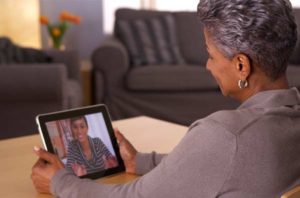 In helping families with caregiving separated by the miles, Great Care looks to the Alzheimer’s Association for tips. The nonprofit offers guidance in navigating today’s fast-paced world while caregiving, as many families are geographically spread apart.
In helping families with caregiving separated by the miles, Great Care looks to the Alzheimer’s Association for tips. The nonprofit offers guidance in navigating today’s fast-paced world while caregiving, as many families are geographically spread apart.
“We are not always able to provide the hands-on care we would like,” the Association says. “While living at a distance can complicate caregiving, there are resources to help.”
The Alzheimer’s Association’s website, at www.alz.org, includes long-distance caregiving tips and resources for making the most of visits, and can help assess care needs.
“Taking care of concerns, such as a family member’s safety, nutrition and health, can be difficult when you live in another city, state or country,” the Alzheimer’s Association says. “But getting organized and being prepared can go a long way in helping coordinate care from a distance.”
The national nonprofit suggests families with caregiving needs identify resources and use them.
“Learn about what is available in your community by contacting your local Alzheimer’s Association at 1.800.272.3900, or using our online Community Resource Finder. You can also use Alzheimer’s Navigator, our free online tool that helps evaluate your needs, identify action steps and connect with local programs and services.”
Also, reassess care needs during each visit, especially involving the progressive nature of dementia and Alzheimer’s.
“Dementia is a progressive disease, and care will need to be adjusted over time. While someone in early-stage Alzheimer’s may live independently, by the middle stage, 24-hour supervision will be required,” the AA says. “Each time you visit, assess the situation to make sure care needs are being met.”
Communication is also key when family members are helping with long-distance care for loved ones with dementia. There are many moving parts to coordinate, says the the Alzheimer’s Association.
“Whether it is with family, neighbors or home health aides, set aside time to regularly discuss the needs of the person with dementia. If the person with dementia lives at a residential care facility, set up a regular time with the managing nurse or physician to get updates, and maintain ongoing communication with care staff and friends who visit regularly.”
The Alzheimer’s Association also reminds families to gather pertinent caregiving information and keep it handy.
“Make sure you have contact information for physicians, pharmacies, care providers and neighbors, as well as important financial and legal documents easily accessible in case they are unexpectedly needed.”
Most importantly, be kind to yourself as caregivers.
“Living out of town does not mean you aren’t involved or that you don’t care. Get support by connecting with others who are long-distance caregivers through our online community.”
The Mayo Clinic agrees, noting that long-distance caregivers can have feelings of guilt because they’re not present for their loved ones.
“Many long-distance caregivers feel guilty about not being able to do enough or spend adequate time with a family member in need of care,” the Clinic says. “If you’re feeling guilty, remind yourself that you’re doing the best you can. It might be helpful to join a support group for caregivers. You might benefit from the tips of others as well as the knowledge that you’re not alone.”
Julie Sullivan, Great Care founder and CEO, reminds families that a strong community exists in the growing caregiving world.
“We understand that aging can present challenges, anxiety and fear. Children of aging parents struggle with decisions to keep their loved one safe and well, but also comfortable and content,” she says.
The Care Compass that Great Care has created helps families navigate age-related issues, such as coordinating the transition into assisted living or finding a caregiver to provide residential care, our licensed professionals will help you navigate through this time and make careful decisions that will positively impact your loved one.
For more information, visit ineedgreatcare.com/care-compass.
The professionals at Great Care are available to talk with you and your family about all of your home care needs, including respite care. Great Care is a non-medical in-home care agency providing quality and affordable elder care in Fishers, IN and the surrounding areas. Call (888) 240-9101 for more information.
Follow Us!